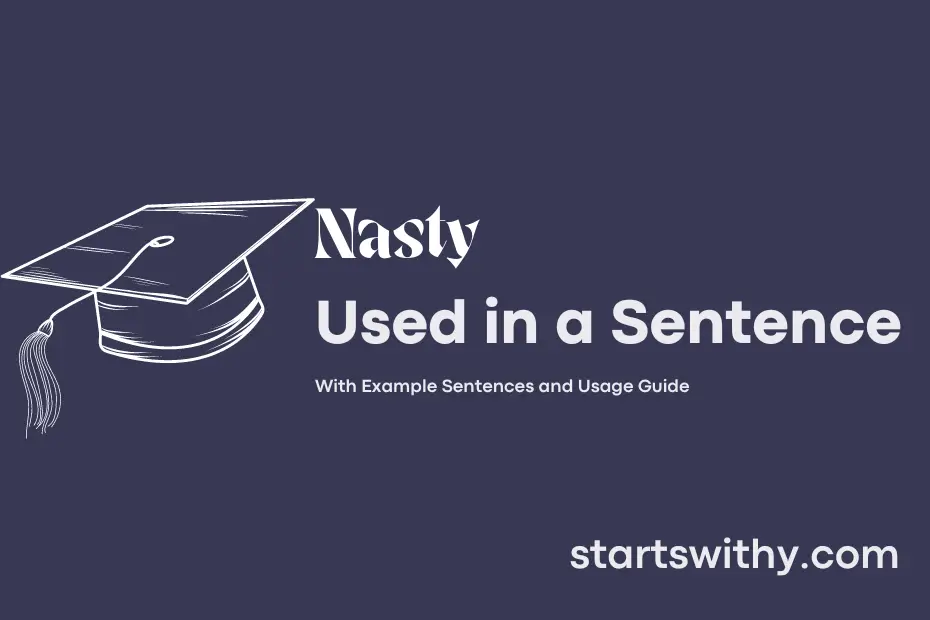Have you ever struggled to find just the right word to describe something that is unpleasant or highly disagreeable? Look no further, as the term “nasty” perfectly encapsulates such situations.
When we label something as nasty, we are essentially highlighting its off-putting, distasteful, or even morally objectionable nature. Whether it’s describing a foul odor, a vicious remark, or a malicious act, the word “nasty” packs a powerful punch in conveying a strong sense of aversion or disgust.
7 Examples Of Nasty Used In a Sentence For Kids
- The nasty cat hissed at the dog.
- Don’t eat the nasty food, it’s spoiled.
- The nasty bugs made me run away.
- I don’t like it when people use nasty words.
- The nasty smell coming from the garbage made me cover my nose.
- Be careful, that plant has nasty thorns.
- Please don’t touch the nasty mud, it’s dirty.
14 Sentences with Nasty Examples
- I can’t believe he left such a nasty mess in the common room.
- The food in the hostel mess was so nasty that I couldn’t eat it.
- My roommate’s behavior towards me has been really nasty lately.
- The weather during monsoon season can get pretty nasty in India.
- I accidentally spilled my chai on my notes and now they smell nasty.
- The washrooms in the college are always so nasty; I hate using them.
- The wifi connection in the hostel is acting up again, it’s really nasty.
- The professor didn’t have to make such a nasty comment about my presentation in front of everyone.
- The mosquitoes in the area are so nasty; I keep getting bitten.
- I lent my textbook to a classmate and they returned it with nasty stains all over it.
- The study group room was left in a nasty state after the last group used it.
- I accidentally sat on a bench that had some nasty gum stuck to it.
- The cafeteria served nasty food during the college event, no wonder it was unpopular.
- I woke up to find a nasty cockroach crawling on my backpack in my hostel room.
How To Use Nasty in Sentences?
Nasty can be used as an adjective to describe something unpleasant, unkind, or dirty. Here’s a simple guide on how to use it in a sentence for beginners:
-
Describing something unpleasant: When you want to express that something is distasteful or disagreeable, you can use nasty. For example, “The smell coming from the garbage can was really nasty.”
-
Describing someone unkind: If you want to talk about someone who is mean or unpleasant in their behavior, you can use nasty. For instance, “The bully said some really nasty things to the other kids.”
-
Describing something dirty: When referring to something unclean or soiled, nasty is a fitting term. For instance, “The bathroom was nasty and needed a good cleaning.”
-
Using it humorously: Sometimes, nasty can also be used in a lighthearted or joking manner to describe something in an exaggerated way. For example, “The cat left a nasty surprise in my shoe this morning.”
Remember to use nasty with care as it can be a strong word with negative connotations. Practice using it in different sentences to become more comfortable with incorporating it into your vocabulary.
Conclusion
In summary, the use of sentences containing the keyword “nasty” demonstrates the wide range of contexts in which this word can be applied. From describing unpleasant weather to criticizing someone’s behavior, “nasty” is a versatile term that conveys a strong sense of negativity or disdain. Whether referring to a foul odor, a mean-spirited remark, or a tough situation, sentences featuring “nasty” help to emphasize the severity of the subject being discussed.
Overall, incorporating the word “nasty” into sentences adds a punch of emotion and vivid imagery, allowing for clear and impactful communication. Its usage can effectively convey disgust, criticism, or discomfort, making it a valuable addition to one’s vocabulary when striving to make a point or express strong feelings.



